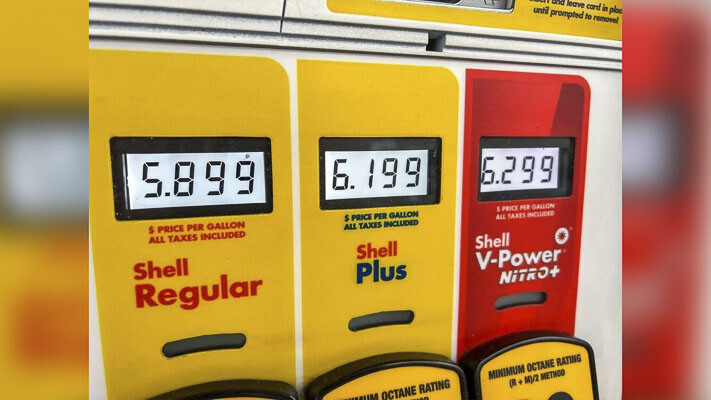
This marks the 16th week of rising fuel prices for Washingtonians in this year alone
Timothy Schumann
The Center Square Washington
The average price of a gallon of regular unleaded was sitting at $4.60 statewide on Monday in Washington, up from $4.58 the week prior, according to AAA data. This marks the 16th week of rising fuel prices for Washingtonians in this year alone following the implementation of the new carbon tax earlier this year.
This two-cent per gallon increase moved with the national average, albeit at a faster pace, which increased from $3.53 to $3.54 per gallon over the same time period.
“Despite mild weather and a less volatile economic forecast, drivers are not hitting the road and raising gasoline demand to traditional seasonal levels,” said AAA spokesperson Andrew Gross in a statement. “It’s possible this is merely the lull before Memorial Day, but it could be a trend that lingers into summer.”
Residents of the Evergreen State have to dig deeper into their wallets than most. Washington’s pump prices currently stand at fourth most expensive nationally, with only California, Hawaii, and Arizona being more expensive, filling out first to third on the list.
Washington’s $4.60 per gallon places it $1.06 per gallon higher than the national average of $3.54 per gallon. It is also $1.63 per gallon above the nation’s least expensive fuel costs of $2.97 per gallon, currently paid by Mississippi residents.
In Washington, intra-state variance remains high at $1.19 per gallon, up 3 cents per gallon from the week prior. The outliers this week, again San Juan and Asotin counties, represent the most and least expensive gas prices statewide at $5.20 and $4.01 per gallon.
This price variance still largely follows the Cascade Range, with residents to the west paying a higher premium at the pump than residents to the east.
Some state policy experts think there’s a legislative component to the relatively high cost of Washingtonians’ fuel, as previously reported by The Center Square, citing the state’s new cap-and-trade carbon tax program implemented Jan. 1 of this year.
However, the full effect of this program has yet to be seen, as there has only been one carbon auction to date.
With the registration closed for the second auction as of May 1 and all bids due by May 19, we should be seeing the results of the May 31 auction on fuel pricing soon.
Results from this auction are expected to be announced on June 7.
This report was first published by The Center Square Washington.
Also read:
- Opinion: Hiding the growing cost of the Interstate Bridge replacementJoe Cortright of the City Observatory addresses the rising cost of the Interstate 5 Bridge replacement project.
- 90 minutes of delay on Southbound I-5 in Southwest Washington on Friday afternoon, July 26Travelers using southbound Interstate 5 through Woodland should expect up to 90 minutes of delay during Friday afternoon and evening and should delay travel or prepare for additional travel time.
- Nighttime paving work on I-5 and SR 14 in Clark County July 28-Aug. 9Nighttime travelers in Clark County should expect delays for maintenance and paving work beginning Sunday, July 28 until the morning of Friday, Aug. 9.
- Northeast 182nd Avenue/Northeast Ward Road to be closed on Aug. 1Northeast 182nd Avenue and Northeast 172nd Avenue in Clark County will have single-day closures on August 1 and August 5 for road preservation, with detours in place.
- Interstate Bridge Replacement program awarded $1.499 billion FHWA Bridge Investment Program grantInterstate Bridge Replacement program officials have shared that the program received $1.499 billion through the Federal Highway Administration’s Bridge Investment Program.









